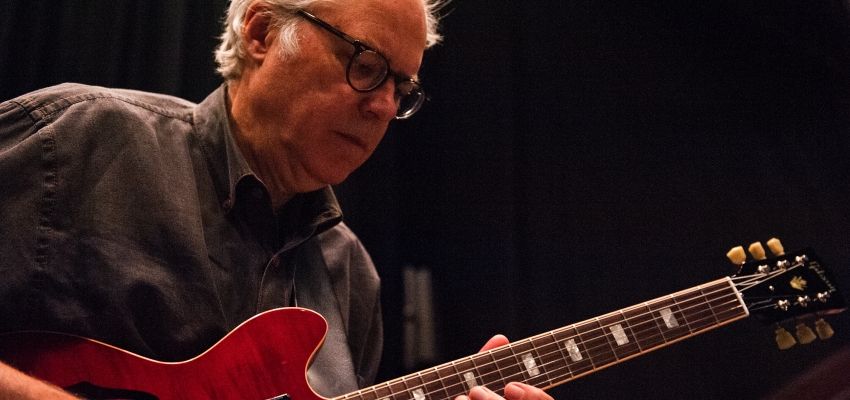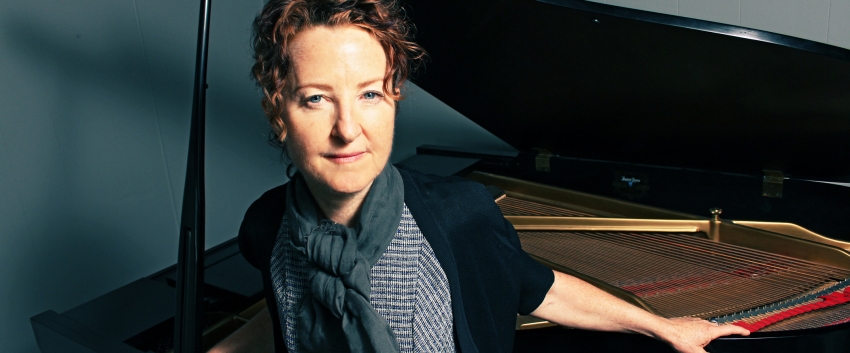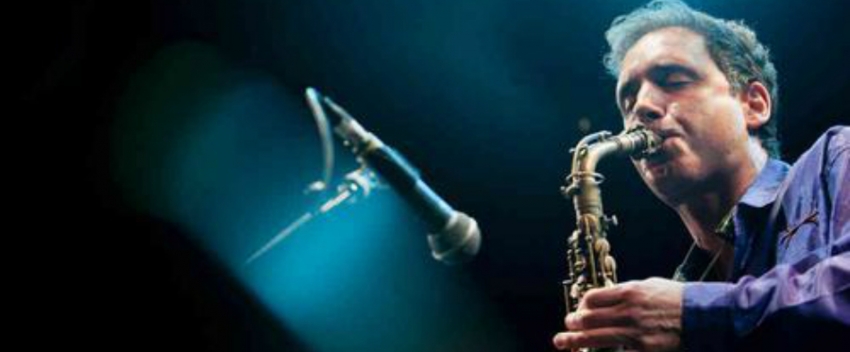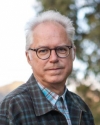Over the past ten years the student-led Improvised Music Project has instigated new directions in Seattle’s jazz and improvised music scene. The annual festival, which groups up-and-coming musicians, faculty all-stars, and seasoned professionals of international renown, is IMP’s signature annual event. World-renowned guitarist Bill Frisell, jazz pianist Myra Melford, and Alto Sax player Andrew D'Angelo headline this year’s festival.
Featuring:
Myra Melford, piano
Andrew D'Angelo, alto saxophone
Bill Frisell, guitar
UW Jazz Students and Faculty
Wednesday, May 30: Myra Melford, piano
UW students Abbey Blackwell, Logan Heine, Lucas Winter, Matt Carr
Bill Frisell + UW Jazz Faculty
Thursday, May 31: Andrew D’Angelo, saxophone
UW students Wyatt Gardner, Elias Hampton, Anthony Lefaive, Jack Hillman, Andrew Sumabat, Stuart MacDonald
Bill Frisell + UW Jazz Faculty
...
PLUS: Meet the Artist Sessions:
Wed. 5/30, 12:30 pm, Meany Studio Theater: Myra Melford and Andrew D’Angelo
Thu. 5/31, 12:30pm, Meany Studio Theater: Andrew D’Angelo and Carlo Cennamo:
“Saxophone - The Mechanics and the Artist”
Artist Bios:
Myra Melford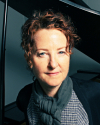 For pianist, composer and Guggenheim fellow Myra Melford, the personal and the poetic have always been intimately and deeply connected. Raised outside Chicago in a house designed by the renowned architect Frank Lloyd Wright, Melford grew up literally surrounded by art. Where most of us find the beauty in our childhood homes through the memories and associations we make within its four walls, Melford saw early on that aesthetic expression could both be built from and be a structure for profound emotions.
For pianist, composer and Guggenheim fellow Myra Melford, the personal and the poetic have always been intimately and deeply connected. Raised outside Chicago in a house designed by the renowned architect Frank Lloyd Wright, Melford grew up literally surrounded by art. Where most of us find the beauty in our childhood homes through the memories and associations we make within its four walls, Melford saw early on that aesthetic expression could both be built from and be a structure for profound emotions.
Over the course of a career spanning more than two decades, Melford has taken that lesson to heart, crafting a singular sound world that harmonizes the intricate and the expressive, the meditative and the assertive, the cerebral and the playful. Drawing inspiration from a vast spectrum of cultural and spiritual traditions and artistic disciplines, she has found a “spark of recognition” in sources as diverse as the writings of the 13th-century Persian poet Rumi and the Uruguayan journalist Eduardo Galeano; the wisdom of Zen Buddhism and the Huichol Indians of Mexico; and the music of mentors like Jaki Byard, Don Pullen, and Henry Threadgill.
The latest incarnation of this ever-evolving cross-disciplinary dialogue is Language of Dreams, which will premiere in November 2013 at the Yerba Buena Center for the Arts. The multi-media work is inspired by Uruguayan writer Eduardo Galeano’s Memory of Fire trilogy, a history of the Americas told through indigenous myths and the accounts of European colonizers. The piece will combine music for Melford’s quintet Snowy Egret with narration by a multi-lingual actor, dance by Los Angeles-based choreographer Oguri, and video by Bay Area filmmaker David Szlasa.
While Language of Dreams is her most ambitious project to date, it is not the first time that Melford has constructed a piece from such a wealth of disciplines. In 2006, the Walker Arts Center premiered Knock on the Sky, a piece inspired by Albert Camus’ essay “The Myth of Sisyphus” and Kobo Abe’s novel Woman in the Dunes, in which Melford collaborated with New York City–based choreographer/dancer Dawn Akemi Saito and Austrian architect Michael Haberz.
Snowy Egret, Melford’s latest working group, made its debut in 2012. The quintet comprises some of creative music’s most inventive and individual voices: trumpeter Ron Miles, guitarist Liberty Ellman, bassist Stomu Takeishi, and drummer Tyshawn Sorey. Melford’s spacious, contemplative, exploratory compositions have long attracted and almost demanded such forward-thinking artists. Her past ensembles have included Be Bread, with Cuong Vu, Ben Goldberg, Brandon Ross, Stomu Takeishi, and Matt Wilson; The Same River, Twice, with Dave Douglas, Chris Speed, Erik Friedlander, and Michael Sarin; Crush, with Takeishi, Vu, and Kenny Wolleson.
Melford also currently is one-third of the collective Trio M with bassist Mark Dresser and drummer Matt Wilson; their most recent CD, The Guest House, was one of 2012’s most acclaimed releases. She also performs in the duo ::Dialogue:: with clarinetist Ben Goldberg and will release her first solo album in October 2013, a collection of work inspired by the paintings of the late visual artist Don Reich.
Melford’s musical evolution has long run in parallel with her spiritual search, a personal journey that has led her to Aikido, Siddha Yoga, and the wisdom traditions of the Huichol people of Mexico’s central highlands. Sonically, that quest is expressed via her wide-ranging palette, which expands from the piano to the harmonium and electronic keyboards or to amplifying barely audible sounds in the piano’s interior. Her playing can build from the blissful and lyrical to the intense and angular, with accents from Indian, African, Cuban and Middle Eastern musics or the cerebral abstraction of European and American jazz and classical experimentalism.
While Melford’s music continually reaches toward a state of transcendence, it still remains deeply rooted in the blues traditions she heard growing up in the Chicago area. In 1978, she first encountered violinist Leroy Jenkins, her introduction to the AACM, whose boundary-free, adventurous approach to jazz remains an influence. She would go on to study with Jenkins, together forming the collective trio Equal Interest with multireedist Joseph Jarman in 1997.
Melford moved to the east coast in 1982 and began performing in New York City’s thriving Downtown scene, making her recorded debut as a leader in 1990; she has since released more than twenty albums as a leader or co-leader and appeared on more than 40 releases as a side-person. In 2000, she spent a year in North India on a Fulbright scholarship, immersing herself in the region’s classical, devotional, and folk music. Melford relocated to the west coast in 2004, joining the faculty of the University of California, Berkeley as an associate professor of contemporary improvised music. There, she engages students in the theory and practice of improvisation, employing diverse creative strategies.
Her work has earned Melford some of the highest accolades in her field. In 2013 alone, she was named a Guggenheim Fellow and received the Doris Duke Charitable Foundation’s Performing Artist Award and a Doris Duke Residency to Build Demand for the Arts for her efforts to re-imagine the jazz program at San Francisco’s Yerba Buena Center for the Arts. She was also the winner of the 2012 Alpert Award in the Arts for Music. She has been honored numerous times in DownBeat’s Critics Poll since 1991 and was nominated by the Jazz Journalists Association as Pianist of the Year in 2008 and 2009 and Composer of the Year in 2004.
Andrew D'Angelo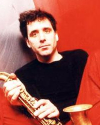 Andrew D'Angelo's charismatic presence and iconoclastic musical ambition have been well-established over the course of his twenty year plus career and his key roles in bands like Human Feel, the Matt Wilson Quartet and Tyft. His dedication to pushing his limits and his willingness to delve into new musical areas have been powerful inspirations to his peers and to a new generation of improvisers. His forceful tone and aggressive improvisational style have made him one of the most influential alto saxophonists of his time.
Andrew D'Angelo's charismatic presence and iconoclastic musical ambition have been well-established over the course of his twenty year plus career and his key roles in bands like Human Feel, the Matt Wilson Quartet and Tyft. His dedication to pushing his limits and his willingness to delve into new musical areas have been powerful inspirations to his peers and to a new generation of improvisers. His forceful tone and aggressive improvisational style have made him one of the most influential alto saxophonists of his time.
Andrew D'Angelo was raised in Seattle, where he forged powerful musical and personal relationships with fellow young musicians Chris Speed and Jim Black before moving to New York City in 1986. He reconnected with Speed and Black in Boston, where they formed Human Feel with guitarist Kurt Rosenwinkel.
Human Feel would prove to be one of the central incubators of new jazz for the 1990's. When the band moved to Brooklyn in the early 1990's, they were rapidly absorbed into the blossoming downtown music scene, becoming sidemen of choice for many world-renowned artists. D'Angelo joined bands and made records with Erik Friedlander, Bobby Previte, Jamie Saft/Cuong Vu and would forge another long-lasting musical relationship with drummer Matt Wilson.
As a composer, D'Angelo has created a powerful personal language rooted in jazz but incorporating influences from electro-acoustic music, noise, and modern classical music. D'Angelo's work as a composer has included music for big band, chamber groups, string orchestra, various jazz ensembles and soloists.
"It's hard to find a more fruitful meditation on American music than in the compositions of guitarist Bill Frisell. Mixing rock and country with jazz and blues, he's found what connects them: improvisation and a sense of play. Unlike other pastichists, who tend to duck passion, Mr. Frisell plays up the pleasure in the music and also takes on another often-avoided subject, tenderness." - The New York Times
Over the years, Frisell has contributed to the work of such collaborators as Paul Motian, John Zorn, Elvis Costello, Ginger Baker, The Los Angeles Philharmonic, Suzanne Vega, Loudon Wainwright III, Van Dyke Parks, Vic Chesnutt, Rickie Lee Jones, Ron Sexsmith, Vinicius Cantuaria, Marc Johnson (in "Bass Desires"), Ronald Shannon Jackson and Melvin Gibbs (in "Power Tools"), Marianne Faithful, John Scofield, Jan Garbarek, Lyle Mays, Vernon Reid, Julius Hemphill, Paul Bley, Wayne Horvitz, Hal Willner, Robin Holcomb, Rinde Eckert, The Frankfurt Ballet, film director Gus Van Sant, David Sanborn, David Sylvian, Petra Haden and numerous others, including Bono, Brian Eno, Jon Hassell and Daniel Lanois on the soundtrack for Wim Wenders' film Million Dollar Hotel.
This work has established Frisell as one of the most sought-after guitar voices in contemporary music. The breadth of such performing and recording situations is a testament not only to his singular guitar conception, but his musical versatility as well. This, however, is old news by now. In recent years, it is Frisell's role as composer and band leader which has garnered him increasing notoriety.
Much has been made of the uncategorizable nature of Frisell's music and the seamlessness with which his bands have navigated such a variety of styles. "Frisell's pals just happen to be superb musical chameleons, up to every change of gears and genre the guitarist's catch-all music throws at them. The band even comfortably follows the leader onto Country and Western turf, as Frisell often approximates the whine of a lonely steel guitar." (Minneapolis Star Tribune). Bill's comments to the same publication: "When I was in Colorado, I never really played that country stuff or even liked it that much, though it was all over the radio. But as I got older, it crept into my music a lot." In fact, the Chicago Tribune observed that "Frisell possesses not only impressive compositional skills but also a remarkable ability to encompass seemingly antagonistic musical genres." Commenting on his eclectic compositional inclinations, Frisell told Down Beat: "When I write something, it just sort of comes out. I'm not thinking, 'Now I'm going to write a cowboy song'. It just happens, then I usually think about what must have influenced it later. When I sit down to write something in a certain style, it doesn't work. I don't know if that's important or something I need to do, or if it doesn't matter. I don't care; I'm just thankful something comes out sometimes."
This musical kinship with Miles Davis has been cited repeatedly in the music press. The New Yorker notes: "Bill Frisell plays the guitar like Miles Davis played the trumpet: in the hands of such radical thinkers, their instruments simply become different animals. And, like Davis, Frisell loves to have a lot of legroom when he improvises--the space that terrifies others quickens his blood."
